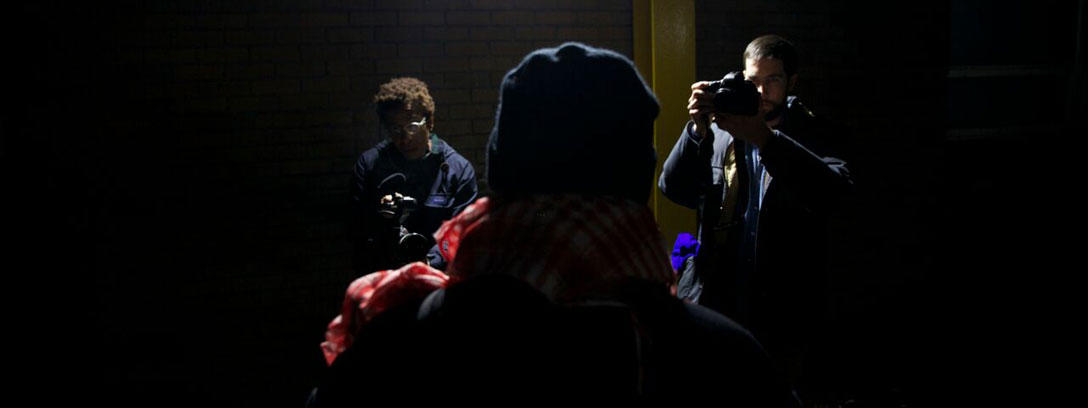Nate von Zumwalt
If fear is in fact the most powerful motivator, then (T)Error may have us all hand-wringing and galvanized come the credits.
In their feature debut, co-directors Lyric R. Cabral and David Felix Sutcliffe cleverly infiltrate a real life counterterrorism sting carried out by a veteran FBI informant known as Saeed Torres, or “Shariff.” But (T)Error’s marketing pitch that positions the film as the first of its kind is somehow less compelling than the opaque complexities that emerge each time the filmmakers peel back another layer in their narrative-driven investigation.
At (T)Error’s core we find Cabral and Sutcliffe straining themselves to achieve access to Shariff’s probe of Khalifah Al-Akili, a white American Muslim convert whom the FBI has pinned after discovering his pro-Bin Laden sentiments on Facebook. In fact, the amount of intel in (T)Error culled from social media, text messages, and other ostensibly trivial communications is shocking, if not a bizarre sign of the times.
And along with the FBI’s own text messages to Shariff—which read like a high school tyrant supervising cafeteria drama—the Bureau comes off as alarmingly naïve and underprepared. In their defense, it’s impossible to assess the FBI’s investment in this particular case, but the (T)Error team does none of its subjects any favors by seemingly outfoxing them all.
To wit, the greatest perceived threat, Al-Akili, is interviewed by Cabral and Sutcliffe themselves before the reel runs out. It all transpires without the knowledge of the FBI or Shariff.
Much of (T)Error is either partially or entirely inscrutable. Its narrative, redolent of a spy thriller, depends on that murkiness. Questions never seem explicitly posed, and moments that should provoke fear are attenuated by the directors’ cunning ability to set them against the quotidian—Shariff watching television or waiting for his coffee to brew.
But other things are clearer, and they provide just as much motivation to digest this striking work of documentary storytelling. Here are 4 reasons to see (T)Error, which is now playing at IFC Film Center in New York and expands throughout the country this month.

1. Shariff was co-director Lyric Cabral’s neighbor, who abruptly vanished.
“One day, after four years of talking almost every day, I came to his apartment and it was just cleared out. And tehn I get a call from him, and he sounded incredibly frantic, I had never heard this tone in his voice. It was almost like I could picture someone at the other end of the line with a gun to his head. And he said, ‘Lyric, if anyone asks any questions about me, don’t give them any information.’ But sort of, ‘you give me there information, let me know who’s looking for me.’ And it was such an odd call, that all I could ask was, ‘Why?’ He disclosed that the apartment in which we had been conversing for four years was essentially a safe house.” — Lyric R. Cabral
2. The film sheds light on the impenetrable world of FBI informants.
“During this time, it has been impossible to ignore the FBI’s increasing reliance on untrained, criminal informants, who have played a central role in nearly 50% of all domestic terrorism cases. These individuals can earn more than $100,000 per case, and are instructed to build relationships with persons of investigative interest. Informants typically use a mixture of persuasion, coercion, and financial incentives to induce gullible individuals to engage in or support acts of terrorism.” — Cabral & Sutcliffe
3. It is the first-ever investigation into a counterterrorism sting.
“Saeed ‘Shariff’ Torres, an informant who has worked for the Bureau since the early ’90s, volunteered to provide us with unprecedented access to the inner workings of an FBI investigation in Pittsburgh. The story we documented illuminates the murky ethics of our government’s domestic national security efforts, in real-time, as they unfold.” — Cabral & Sutcliffe
4. The film had to be made without the consent of the FBI, which ultimately almost foiled its distribution.
“Saeed, the main character of our film, did not seek out the FBI’s permission to let us film his investigation, knowing that this documentation would be discouraged, and potentially thwarted, by the Bureau’s institutionalized lack of transparency. And yet, because of our access, we are now being forced to pay enormous costs to protect ourselves from potential legal retaliation for presenting this story.” — Lyric R. Cabral




